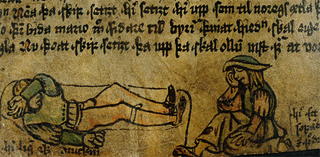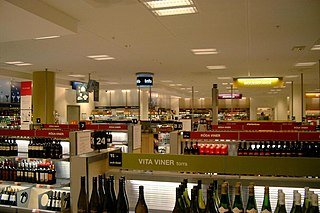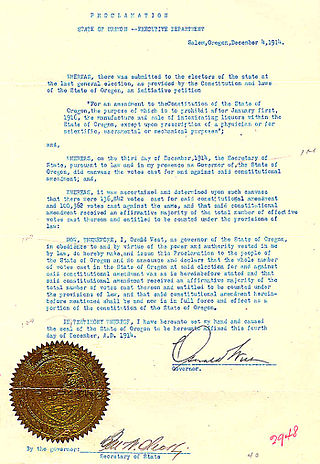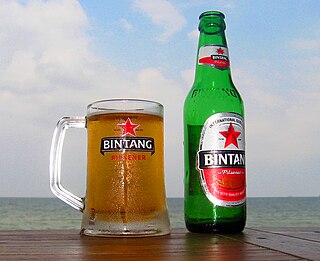Prohibition in Iceland went into effect in 1915 and lasted, to some extent, until 1 March 1989 (since celebrated as "Beer Day"). The ban had originally prohibited all alcohol, but from 1922 legalized wine and in 1935 legalized all alcoholic beverages except beer with more than 2.25% alcohol content. [1] [2] As in many other states with prohibition, "illegal brewing and smuggling of alcoholic beverages were widespread during the ban." [1]
According to one study, "Opposition to beer in Iceland was found to be strongest among Alþingi members from rural areas and traditional socialist parties. The most influential argument against beer alone was that adolescents are particularly susceptible to the temptation to drink beer. Opponents of the beer ban in Alþingi pointed out the peculiar nature of the law allowing hard liquor but prohibiting the weaker beverage. More liberal alcohol policies have increased the total amount of alcohol consumed in Iceland in recent years." [1]
In a 1908 referendum, Icelanders voted in favour of a ban on all alcoholic drinks, going into effect 1 January 1915. In 1921, the ban was partially lifted after Spain refused to buy Iceland's main export, fish, unless Iceland bought Spanish wines. [3] The ban was then modified after a national referendum in 1933 came out in favour of legalising spirits. Strong beer (with an alcohol content of more than 2.25% [4] ), however, was not included in the 1935 vote in order to please the temperance lobby—which argued that beer would lead to more depravity, because it was cheaper than spirits. [5]
As international travel brought Icelanders back in touch with beer, bills to legalise it were regularly moved in the Icelandic parliament, but were shot down on technical grounds. Prohibition lost more support in 1985, when the Minister of Justice and Ecclesiastical Affairs (himself a teetotaler) prohibited pubs from adding legal spirits to legal non-alcoholic beer (called "pilsner" by Icelanders[ citation needed ]) to make a potent imitation of strong beer. Soon after, beer approached legalisation in parliament—a full turnout of the upper house of Iceland's parliament voted 13 to 8 to permit the sales, ending prohibition in the country.
Following the end of prohibition, some Icelanders have celebrated Beer Day on 1 March. [6] Some people may take part in a "rúntur" (bar crawl), with a few bars staying open until 4:00 a.m. the next day. [7] The legalisation of beer remains a significant cultural event in Iceland as beer has become the most popular alcoholic beverage. [8]

Prohibition is the act or practice of forbidding something by law; more particularly the term refers to the banning of the manufacture, storage, transportation, sale, possession, and consumption of alcoholic beverages. The word is also used to refer to a period of time during which such bans are enforced.
National referendums are seldom used in Canada. The first two referendums in 1898 and 1942 saw voters in Quebec and the remainder of Canada take dramatically-opposing stands, and the third in 1992 saw most of the voters take a stand dramatically opposed to that of the politicians in power.

The Société des alcools du Québec is a provincial Crown corporation and monopoly in Quebec responsible for the trade of alcoholic beverages within the province.
Brennivín is considered to be Iceland's signature distilled beverage. It is distilled from fermented grain mash and then combined with Iceland's very soft, high-pH water, and flavored only with caraway. A clear, savory, herbal spirit, the taste is often described as having notes of fresh rye bread. It is considered to be a type of aquavit and bottled at 40% ABV. The steeping of herbs in alcohol to create schnapps is a long-held folk tradition in Nordic countries, and Brennivín is still the traditional drink for the mid-winter feast of Þorrablót. Today, Icelanders typically drink it chilled, as a shot, with a beer, or as a base for cocktails. It often takes the place of gin in classic cocktails, or of a lighter rum in tropical drinks.
Alcoholic beverage control states, generally called control states, less often ABC states, are 17 states in the United States that have state monopoly over the wholesaling or retailing of some or all categories of alcoholic beverages, such as beer, wine, and distilled spirits.

Beer in Iceland likely dates back to the island's settlement by Norsemen. In more modern history beer was effectively banned in Iceland for most of the 20th century. Since that ban was lifted in 1989, Iceland's consumption of beer has increased markedly and new breweries have begun to emerge.

The Alberta Gaming, Liquor and Cannabis Commission (AGLC) is an agency of the government of the Canadian province of Alberta, and regulates alcoholic beverages, recreational cannabis, and gaming-related activities. References to cannabis were added to AGLC's name and governing legislation as cannabis in Canada moved towards legalization in 2018. AGLC was created in 1996 as the Alberta Gaming and Liquor Commission by combining the responsibilities and operations of the Alberta Liquor Control Board (ALCB), Alberta Lotteries, the Alberta Gaming Commission, Alberta Lotteries and Gaming and the Gaming Control Branch. The current Chief Executive Officer as of 2020 is Kandice Machado.

Prohibition in Canada was a ban on alcoholic beverages that arose in various stages, from local municipal bans in the late 19th century, to provincial bans in the early 20th century, and national prohibition from 1918 to 1920. The relatively large and powerful beer and alcohol manufacturing sector, and the huge working class that purchased their products, failed to convince any of the governments to reverse their stance on prohibition. Most provinces repealed their bans in the 1920s, though alcohol was illegal in Prince Edward Island from 1901 to 1948. By comparison, Ontario's temperance act was in effect from 1916 to 1927.

An alcohol monopoly is a government monopoly on manufacturing and/or retailing of some or all alcoholic beverages, such as beer, wine and spirits. It can be used as an alternative for total prohibition of alcohol. They exist in all Nordic countries except Denmark proper, and in all provinces and territories in Canada except Alberta. In the United States, there are some alcoholic beverage control states, where alcohol wholesale is controlled by a state government operation and retail sales are offered by either state or private retailers.

The alcohol laws of Kansas are among the strictest in the United States, in sharp contrast to its neighboring state of Missouri, and similar to its other neighboring state of Oklahoma. Legislation is enforced by the Kansas Division of Alcoholic Beverage Control.
The Quebec referendum on the prohibition of alcohol, held on April 10, 1919, considered the legalization of the sale of beer, cider and wine in the province of Quebec, Canada. The 'yes' side won with 78.62% of the votes.

The U.S. state of Oregon has an extensive history of laws regulating the sale and consumption of alcoholic beverages, dating back to 1844. It has been an alcoholic beverage control state, with the Oregon Liquor and Cannabis Commission holding a monopoly over the sale of all distilled beverages, since Prohibition. Today, there are thriving industries producing beer, wine, and liquor in the state. Alcohol may be purchased between 7 a.m. and 2:30 a.m for consumption at the premise it was sold at, or between 6 a.m. and 2:30 a.m. if it is bought and taken off premise. In 2020, Oregon began allowing the sale of alcohol via home delivery services. As of 2007, consumption of spirits was on the rise while beer consumption held steady. That same year, 11% of beer sold in Oregon was brewed in-state, the highest figure in the United States.
In Iceland, Beer Day is celebrated every year on March 1, honoring the elimination of the 74-year prohibition of beer. Prohibition lasted from January 1, 1915 to March 1, 1989.
Canadian liquor plebiscites, held in 1920 under the Canada Temperance Act and the Dominion Elections Act, were referendums on the strengthening of the Prohibition measures in effect in several provinces of Canada. Voters were asked if they supported banning of importation of liquor across provincial boundaries. The referendums were held on July 10, 1920, in New Brunswick; on October 20 in British Columbia; and on October 25 in Alberta, Manitoba, Nova Scotia, and Saskatchewan.

Alcohol laws are laws relating to manufacture, use, being under the influence of and sale of alcohol or alcoholic beverages. Common alcoholic beverages include beer, wine, (hard) cider, and distilled spirits. Definition of alcoholic beverage varies internationally, e.g., the United States defines an alcoholic beverage as "any beverage in liquid form which contains not less than one-half of one percent of alcohol by volume". Alcohol laws can restrict those who can produce alcohol, those who can buy it, when one can buy it, labelling and advertising, the types of alcoholic beverage that can be sold, where one can consume it, what activities are prohibited while intoxicated, and where one can buy it. In some cases, laws have even prohibited the use and sale of alcohol entirely.
Blue laws, also known as Sunday laws, are laws that restrict or ban some or all activities on specified days, particularly to promote the observance of a day of rest. Such laws may restrict shopping or ban sale of certain items on specific days. Blue laws are enforced in parts of the United States and Canada as well as some European countries, particularly in Austria, Germany, Switzerland, and Norway, keeping most stores closed on Sundays.

Alcohol in Indonesia refers to the alcohol industry, alcohol consumption and laws related to alcohol in the South East Asian country of Indonesia. Indonesia is a Muslim majority country, yet it is also a pluralist, democratic and secular nation. These social and demographic conditions led to Islamic parties and pressure groups pushing the government to restrict alcohol consumption and trade, while the government carefully considers the rights of non-Muslims and consenting adults to consume alcohol, and estimates the possible alcohol ban effects on Indonesian tourism and the economy.
In the Canadian province of Ontario, severe restrictions on the sale and consumption of alcoholic drink were imposed in localities during the later 19th century. Prohibition was imposed across the province under the 1916 Ontario Temperance Act, until restrictions were somewhat eased with the passage of the Liquor Control Act of 1927 which set up the still existing Liquor Control Board of Ontario. Regulations were further amended in 1934.